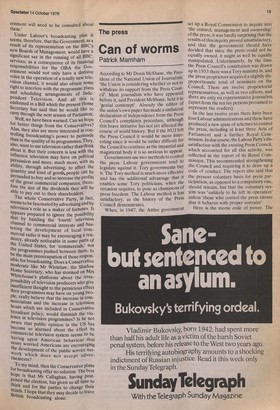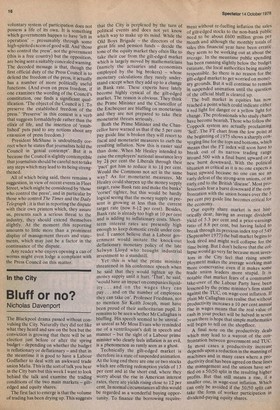The press
Can of worms
Patrick Marn ham
According to Mr Denis McShane, the President of the National Union of Journalists, 'the Union is considering whether or not to withdraw its support from the Press Council'. Most journalists who have appeared before it, said President McShane, held it in 'genial contempt'. Already the editor of the union's own paper has made a unilateral declaration of independence from the Press Council's complaints procedure, although this brave initiative has not yet affected the course of world history. But if the NUJ left the Press Council it would be more interesting since it would be rather difficult for the Council to continue as the impartial and magisterial body it is so anxious to appear. Governments use two methods to control the press. Labour governments tend to legislate against it. Tory governments buy it. The Tory method is much more effective and has the additional advantage that it enables some Tory politicians, when the occasion requires, to pose as champions of press freedom. The Labour method is less satisfactory, as the history of the Press Council demonstrates. When, in 1947, the Attlee government set up a Royal Commission to inquire into the control, management and ownership' of the press, it was hardly surprising that the results of this inquiry proved unsatisfactory, and that the government should have decided that since the press could not be equally owned, it might as well be equally manipulated. Unfortunately, by the time the Press Council's constitution was drawn up in 1953 there was a Tory ministry in, and the press proprietors acquired a slightly disproportionate total of nominees on the Council. There are twelve proprietorial representatives, as well as two editors, and there are only six representative journalists (apart from the ten lay persons presumed to represent the readers).
In the last twelve years there have been four Labour administrations and these have produced a new spate of schemes to control the press, including at least three Acts of Parliament and a further Royal Commission. In due course, the Labour Party's dissatisfaction with the existing Press Council, which accounted for all this activity, was reflected in the report of its Royal Commission. This recommended strengthening the Council and requiring it to draw up a code of conduct. The report also said that the present voluntary basis for press participation, as opposed to a compulsory one, should remain, but that the voluntary system was 'unlikely to be left in operation' unless 'those who control the press ensure that it behaves with proper restraint' Here is the morse code of power. The voluntary system of participation does not possess a life of its own. It is something which governments happen to have 'left in operation' — presumably through some high-spirited excess of good will. And 'those who control the press', not the government (this is a free country) but the opposition, are being sent a suitably concealed warning. The decoded message is that, though the first official duty of the Press Council is to defend the freedom of the press, it actually has a number of more politically useful functions. (And even on press freedom, if one examines the wording of the Council's constitution, one finds a significant qualification. 'The object of the Council is 1. To preserve the established freedom of the press.' Preserve' in this context is a verb that suggests formaldehyde rather than the elixir of life, and the insertion of 'established' puts paid to any notions about any extension of press freedom.) President McShane is undoubtedly correct when he states that journalists hold the Council in 'genial contempt'. But it is because the Council is slightly contemptible that journalists should be careful not to take any steps which may lead to its being strengthened.
All of which being said, there remains a suggestion, in view of recent events in Fleet Street, which might be considered by 'those who control the press', and in particular by those who control The Times and the Daily Telegraph ; it is that in reporting the dispute with their own printers which, they assure us, presents such a serious threat to the industry, they should extend themselves slightly. At the moment this reporting amounts to little more than a prominent display of management threats and statements, which may just be a factor in the continuance of the dispute.
Any reader who enjoys opening a can of worms might even lodge a complaint with the Press Council on this matter.



































 Previous page
Previous page